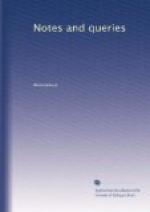R.
“One Holy, Catholic, and Apostolic Church.”—Can any of your correspondents inform me how, or why, the word “holy” is omitted in the above article of the Nicene (Constantinopolitan) Creed, in all our Prayer-books? It is not omitted in the original Greek and Latin.
J.M.W.
The Norfolk Dialect.—Mr. Dickens’ attempt to give interest to his new novel by introducing this dialect would have been even more successful had he been more familiar with the curious peculiarities of that east-coast language. Many of the words are, I believe, quite peculiar to Norfolk and Suffolk, such as, for instance, the following:
Mawther, a girl, a wench. Gotsch, a stone jug. Holl, a dry ditch. Anan? An? an interrogation used when the speaker does not understand a question put to him. To be muddled, to be distressed in mind. Together, an expletive used thus: where are you going together? (meaning several persons)—what are you doing together?
Perhaps some reader can explain the origin of these words.
Icenus.
Sir John Perrot.—Sir John Perrot, governor of Ireland in the reign of Henry VIII., was one of the few rulers over that most unfortunate country who have ruled it wisely. I believe that he was beheaded in the reign of Elizabeth. Will any of your readers kindly inform me whether his life has {218} ever been published, or where I can meet with the best account of him?
E.N.W.
“Antiquitas saeculi juventus mundi.”—Mr. Craik in his admirable little work on Bacon; his Writings and his Philosophy, after quoting the paragraph containing this fine aphoristic expression, remarks that,
“From the manner in which it is here introduced as a Latin phrase, there would seen to be some reason for doubting whether it be an original thought of Bacon’s. It has much the appearance of some aphorism or adage of the schools.” (Vol. ii. p. 55.)
Mr. Craik adds in a note,
“A friend, however, who, if we were to name him, would be recognised as one of the first of living authorities on all points connected with the history of learning and philosophy, informs us that he feels certain of having never met with the expression or the thought in any writer previous to Bacon.”
In Basil Montagu’s edition of The Advancement of Learning it is marked as a quotation. Query. Has the expression, or the thought, been traced to any writer previous to Bacon?
J.M.B.
* * * * *
REPLIES.
DERIVATION OF NEWS.
I have no wish to prolong the controversy on this word, in which I feel I, at least, have had my share. I beg room, however, for an observation on one or two very pertinent remarks by Mr. Singer.




